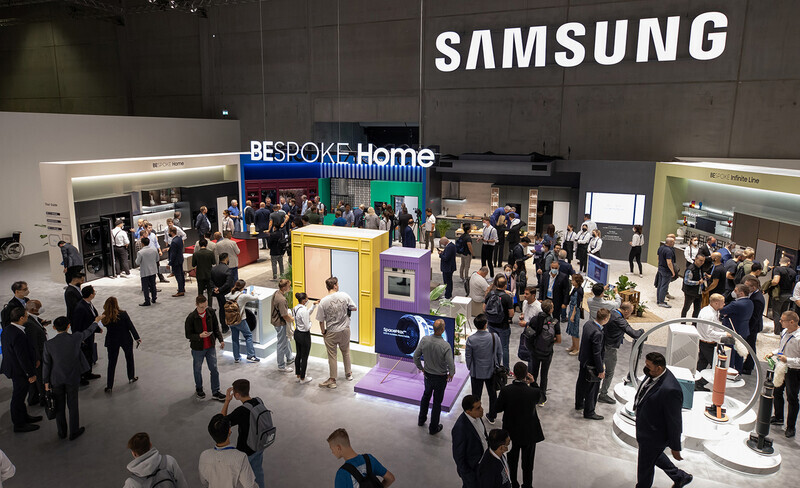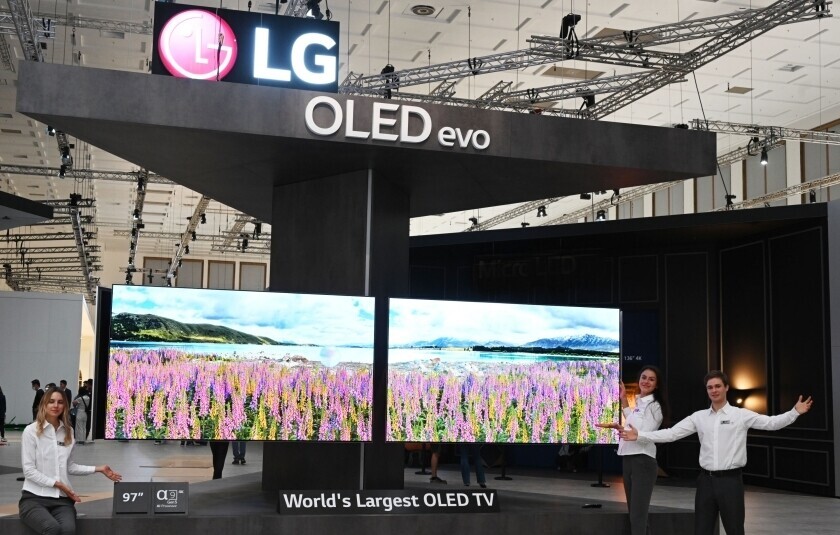hankyoreh
Links to other country sites 다른 나라 사이트 링크
S. Korean factories go idle amid cold winter for domestic production

The smokestacks of major Korean corporations are cooling as predictions of an economic downturn become a reality. In the country’s major industries of smartphones, home electronics and petrochemicals, operating rates have already plummeted in the third quarter, with operating rates for the semiconductor and display sectors poised to fall as well.
“Compared to last year, production of parts for premium products is about the same, but production of widely used parts is about half,” said an employee of a Samsung Electronics subsidiary. “We’ll have to reduce hiring next year, too.”
According to an electronic disclosure by the Financial Supervisory Service on Monday, Samsung Electronics’ component division, which produces parts for smartphones and cars, was operating at 65% capacity in the third quarter, 30 percentage points down from the same period last year.
This means some production facilities are being left idle due to the contraction of the global smartphone market. Samsung Electronics’ smartphone factory was operating at 72.2% capacity, a drop of 8.1 percentage points.
The same goes for TVs, washing machines and displays. LG Electronics' TV factory was operating at 81.1% capacity in the third quarter, 15.3 percentage points lower than the same period last year. Its washing machine factory was at 88% capacity, 17 percentage points lower.
LG Display's Gumi factory was operating at 95% capacity, five percentage points down. With the company in the red since the second quarter, that slowdown will likely continue. Samsung SDI's polarizing film factory was operating at 78% capacity, 22 percentage points down. The shrinking global TV market is to blame.
Samsung Electronics’ semiconductor plants were operating at 100% capacity, along with those of SK Hynix, but they will likely cut operating rates, too, due to production adjustments in response to falling prices.
Operating rates at leading petrochemical companies LG Chem and Lotte Chemical are also falling.
LG Chem’s petrochemical division factories that produce plastics and other items are operating at 84% capacity, down 9.7 percentage points, while Lotte Chemical’s PC factory was operating at 86% capacity, down 16 percentage points.
Falling factory operating rates suggest corporate performance may continue to worsen.
SK Hynix has already announced that it will slash investment by half next year. LG Display has accepted applications from some employees for transfer to other subsidiaries and is now considering rotating leaves.
This is in stark contrast to how, with the launch of the Yoon Suk-yeol administration, major groups pledged 1 quadrillion won in investment and large-scale hiring, including Samsung, which pledged to invest 450 trillion won and hire 80,000 people over five years.
Samsung, SK, LG and other groups say they will push forward with their announced plans. An employee with Samsung Electronics told the Hankyoreh that the company plans to increase hiring with their home electronics unit, and that the company will invest as announced.
SK Group and LG Group employees also said that though there would be some adjustments at poorly performing subsidiaries, the companies would continue to invest for future growth.

However, the mood within the subsidiaries is quite different.
An employee at one of Samsung’s electronics subsidiaries said, “The operating rate will continue to fall, and our big brother Samsung Electronics is really pushing entrenchment, so we will cut investment and hiring.”
“Even if we want to continue investing, the interest payments have grown. We plan to put off investments next year unless they are absolutely necessary and urgent,” remarked an executive at an SK subsidiary.
“The growing interest burden is causing us to reexamine all new investment, and hiring is inevitably going to be cut back compared with past years,” said an official with one SK affiliate.
The situation is also having an impact on partner businesses.
“During the first half of this year, it looked as though we would be signing a Solutions contract, but in the second half, we received word that it was getting put on hold,” said an official at one partner company that had been holding discussions with Samsung Display on the construction of a smart factory.
A source at a company producing semiconductor components in Yongin, Gyeonggi Province, said, “The SK Hynix [orders] have already fallen, and there’s been talk that they could be reduced further next year.”
Amid growing uncertainties with Russia’s invasion of Ukraine early this year and lockdowns in China, major corporations are walking back the optimistic large-scale investment plans that they had been scrambling to present just seven months earlier based on “coordination” with the Yoon Suk-yeol administration.
“Concerns about business conditions have gotten markedly worse over the past month or so,” said one securities company analyst, who asked not to be identified.
“Contrary to what they promised before, the large corporations are heading in a direction where they will have to cut back on investment and hiring next year,” they added.
By Lee Jeong-hun, staff reporter; Yu Sun-hui, staff reporter; Ahn Tae-ho, staff reporter
Please direct questions or comments to [english@hani.co.kr]
Editorial・opinion
![[Guest essay] Preventing Korean Peninsula from becoming front line of new cold war [Guest essay] Preventing Korean Peninsula from becoming front line of new cold war](https://flexible.img.hani.co.kr/flexible/normal/500/300/imgdb/original/2024/0507/7217150679227807.jpg) [Guest essay] Preventing Korean Peninsula from becoming front line of new cold war
[Guest essay] Preventing Korean Peninsula from becoming front line of new cold war![[Column] The state is back — but is it in business? [Column] The state is back — but is it in business?](https://flexible.img.hani.co.kr/flexible/normal/500/300/imgdb/original/2024/0506/8217149564092725.jpg) [Column] The state is back — but is it in business?
[Column] The state is back — but is it in business?- [Column] Life on our Trisolaris
- [Editorial] Penalties for airing allegations against Korea’s first lady endanger free press
- [Editorial] Yoon must halt procurement of SM-3 interceptor missiles
- [Guest essay] Maybe Korea’s rapid population decline is an opportunity, not a crisis
- [Column] Can Yoon steer diplomacy with Russia, China back on track?
- [Column] Season 2 of special prosecutor probe may be coming to Korea soon
- [Column] Park Geun-hye déjà vu in Yoon Suk-yeol
- [Editorial] New weight of N. Korea’s nuclear threats makes dialogue all the more urgent
Most viewed articles
- 1Yoon’s broken-compass diplomacy is steering Korea into serving US, Japanese interests
- 2[Guest essay] Preventing Korean Peninsula from becoming front line of new cold war
- 360% of young Koreans see no need to have kids after marriage
- 4[Reporter’s notebook] In Min’s world, she’s the artist — and NewJeans is her art
- 5S. Korean first lady likely to face questioning by prosecutors over Dior handbag scandal
- 6Lee Jung-jae of “Squid Game” named on A100 list of most influential Asian Pacific leaders
- 7After 2 years in office, Yoon’s promises of fairness, common sense ring hollow
- 8AI is catching up with humans at a ‘shocking’ rate
- 9Hybe-Ador dispute shines light on pervasive issues behind K-pop’s tidy facade
- 10Japan says it’s not pressuring Naver to sell Line, but Korean insiders say otherwise